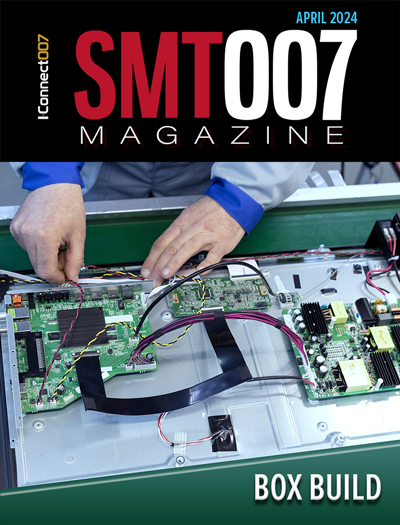-

- News
- Books
Featured Books
- smt007 Magazine
Latest Issues
Current Issue
Box Build
One trend is to add box build and final assembly to your product offering. In this issue, we explore the opportunities and risks of adding system assembly to your service portfolio.

IPC APEX EXPO 2024 Pre-show
This month’s issue devotes its pages to a comprehensive preview of the IPC APEX EXPO 2024 event. Whether your role is technical or business, if you're new-to-the-industry or seasoned veteran, you'll find value throughout this program.

Boost Your Sales
Every part of your business can be evaluated as a process, including your sales funnel. Optimizing your selling process requires a coordinated effort between marketing and sales. In this issue, industry experts in marketing and sales offer their best advice on how to boost your sales efforts.
- Articles
- Columns
Search Console
- Links
- Events
||| MENU - smt007 Magazine
IPC Offers Certification for Electronics Program Management
September 13, 2018 | IPCEstimated reading time: 1 minute
In direct response to requests from industry to provide training and certification in various aspects of the electronics industry, IPC is introducing its newest certification course, the IPC Certified Electronics Program Manager (CEPM) Training and Certification. CEPM is a six-week, online, instructor-led course providing all aspects of program management specific to the electronics industry.
“We’re excited to offer our CEPM course through the e-learning platform IPC EDGE 2.0,” said Dave Hernandez, senior director of learning and professional development. “This course is ideal for existing program managers or engineers who want to advance their expertise and skills in the electronics industry. Because the course is offered online, it offers significant cost savings and flexibility for companies seeking to provide professional development to their top talent.”
The first course will start on October 8, 2018 with two sessions each week for a total of six weeks. The CEPM course will cover:
- Program management
- Project planning
- Team building
- Basic cost accounting practices
- Forecasting and inventory control
- Negotiating contractual terms with customers
- Sales and negotiation skills
IPC’s CEPM course is part of IPC EDGE 2.0 which offers education through online courses, webinars, videos, white papers, personal development, technical knowledge and technical presentations. IPC EDGE 2.0 is convenient and easily accessible, allowing students to learn at their own pace, with knowledge checks within each course to determine next steps.
About IPC
IPC is a global industry association based in Bannockburn, Ill., dedicated to the competitive excellence and financial success of its 4,400 member-company sites which represent all facets of the electronics industry, including design, printed board manufacturing, electronics assembly and test. As a member-driven organization and leading source for industry standards, training, market research and public policy advocacy, IPC supports programs to meet the needs of an estimated $2 trillion global electronics industry. IPC maintains additional offices in Taos, N.M.; Washington, D.C.; Atlanta, GA.; Brussels, Belgium; Stockholm, Sweden; Moscow, Russia; Bangalore and New Delhi, India; Bangkok, Thailand; and Qingdao, Shanghai, Shenzhen, Chengdu, Suzhou and Beijing, China.
For more information on the IPC Certified Electronics Program Manager (CEPM) Training and Certification Program, click here.
Suggested Items
IDTechEx Examines the Opportunities for Wearables in Digital Health
04/19/2024 | IDTechExIDTechEx’s report, “Digital Health and Artificial Intelligence 2024-2034: Trends, Opportunities, and Outlook”, covers this ongoing trend in the consumer health wearables market and includes analysis of the opportunities and roadmap for biometric monitoring.
ZESTRON Welcomes Whitlock Associates as New Addition to their Existing Rep Team in Florida
04/19/2024 | ZESTRONZESTRON, the leading global provider of high-precision cleaning products, services, and training solutions in the electronics manufacturing and semiconductor industries, is thrilled to announce the addition of Whitlock Associates to its esteemed network of sales representatives.
IPC Bestows Posthumous Hall of Fame Award to Industry Icon Michael Ford
04/18/2024 | IPCIPC honored the late Michael Ford, Aegis Software, for his extraordinary contributions to the global electronics manufacturing industry with the IPC Raymond E. Pritchard Hall of Fame Award at IPC APEX EXPO 2024. IPC’s most prestigious honor, the Hall of Fame Award is given to individuals who have provided exceptional service and advancement to IPC and the electronics industry. Ford, an industry leader and valued IPC volunteer, died suddenly in January 2024.
SEMI Applauds U.S. Chips Act Award for Samsung Electronics Facilities to Strengthen Domestic Semiconductor Supply Chain
04/17/2024 | SEMISEMI, the industry association serving the global electronics design and manufacturing supply chain, applauded the United States Department of Commerce’s announcement of a Preliminary Memorandum of Terms for an award under the CHIPS and Science Act to support the expansion of Samsung Electronics’ presence in Texas and the company’s development and production of leading-edge chips.
Northrop Grumman honors Calumet Electronics with Supplier Excellence Award
04/17/2024 | Calumet ElectronicsNorthrop Grumman Corporation has recognized Calumet Electronics during the company’s 2024 Supplier Excellence Awards for “exceptional performance and unwavering commitment to delivering with excellence.” Calumet is one of 70 suppliers recognized from across the globe. In its award category of “Supplier Strategic Excellence,” Calumet was honored alongside global corporations such as Amazon Web Services, Dell Technologies, and Eaton Corporation.


